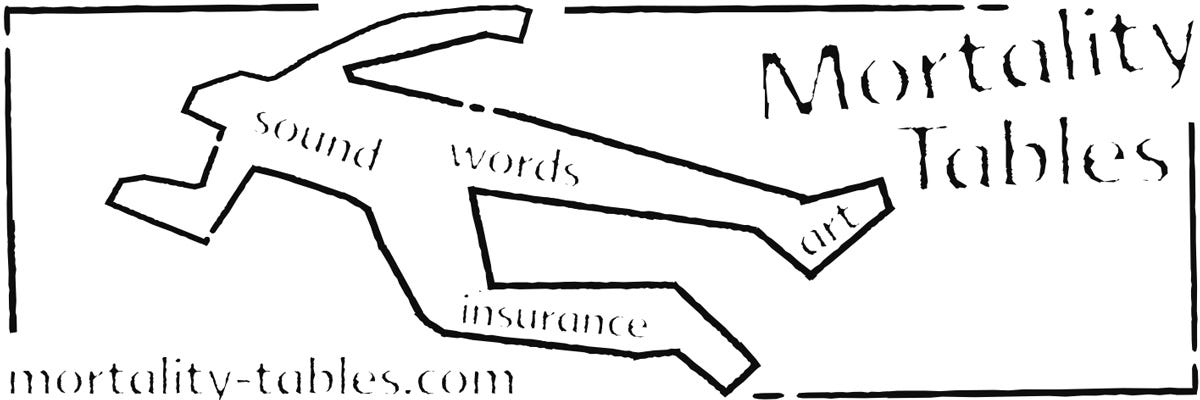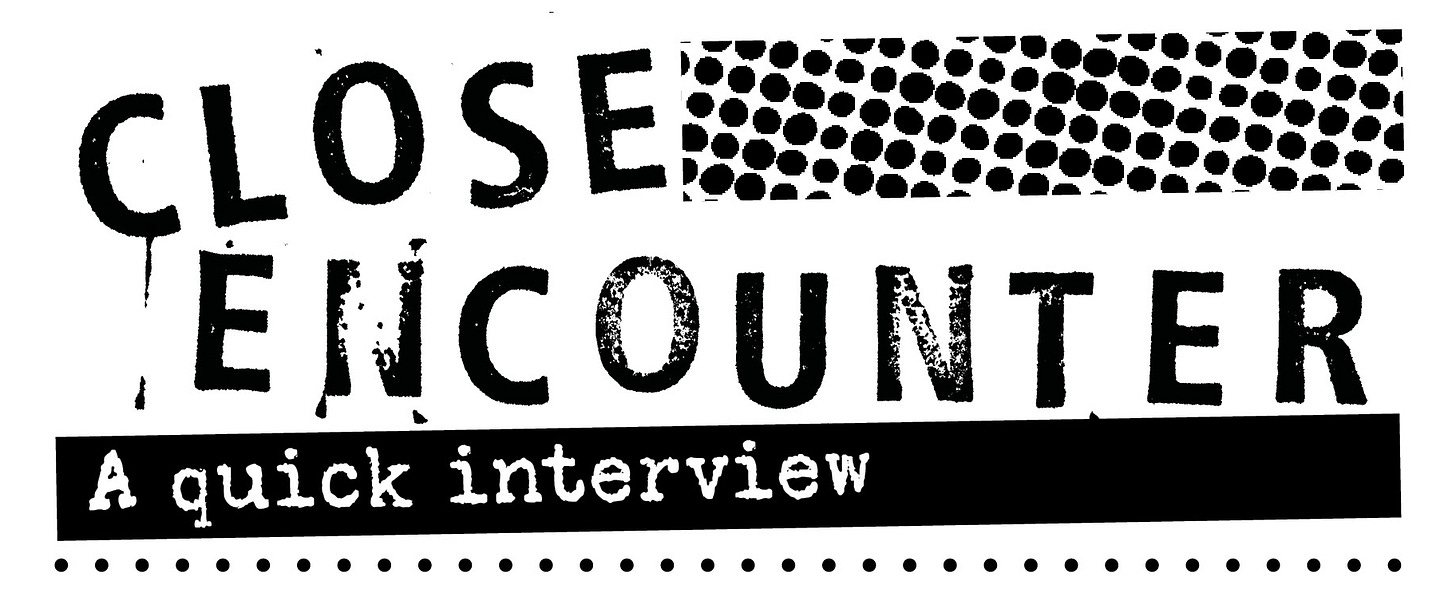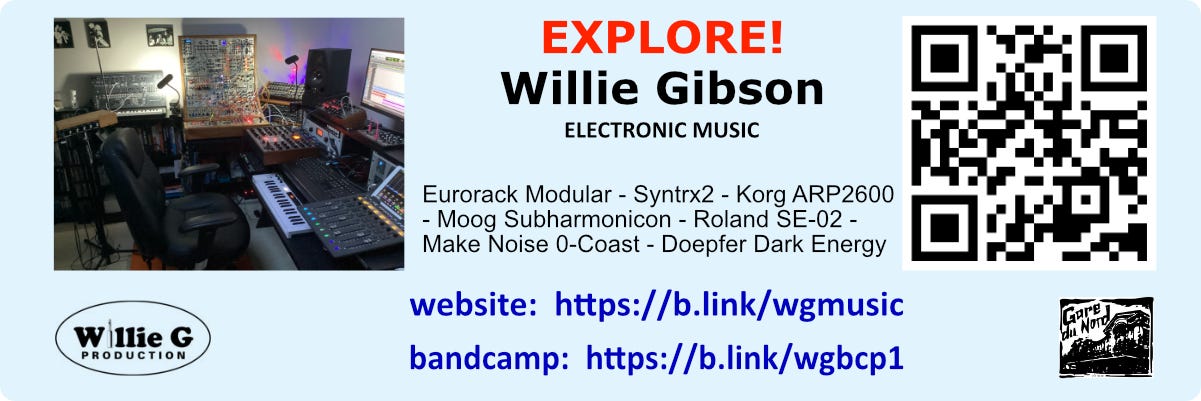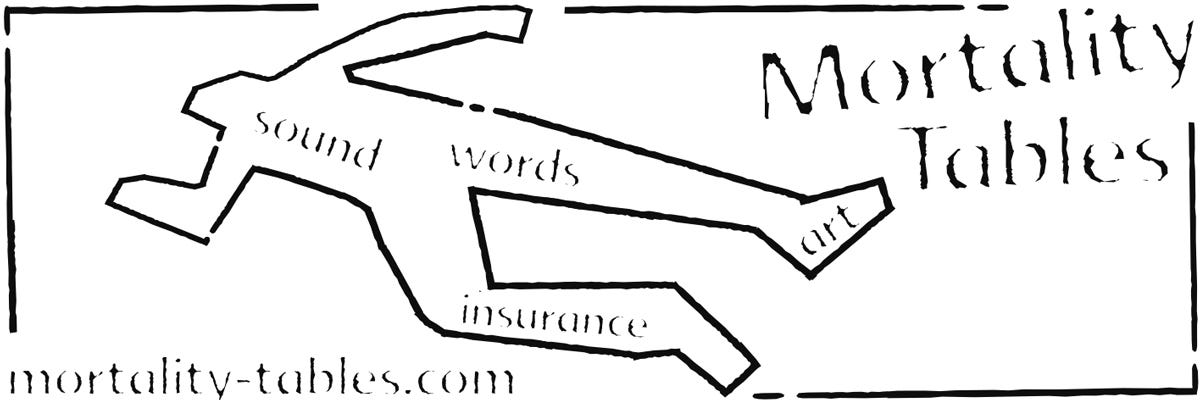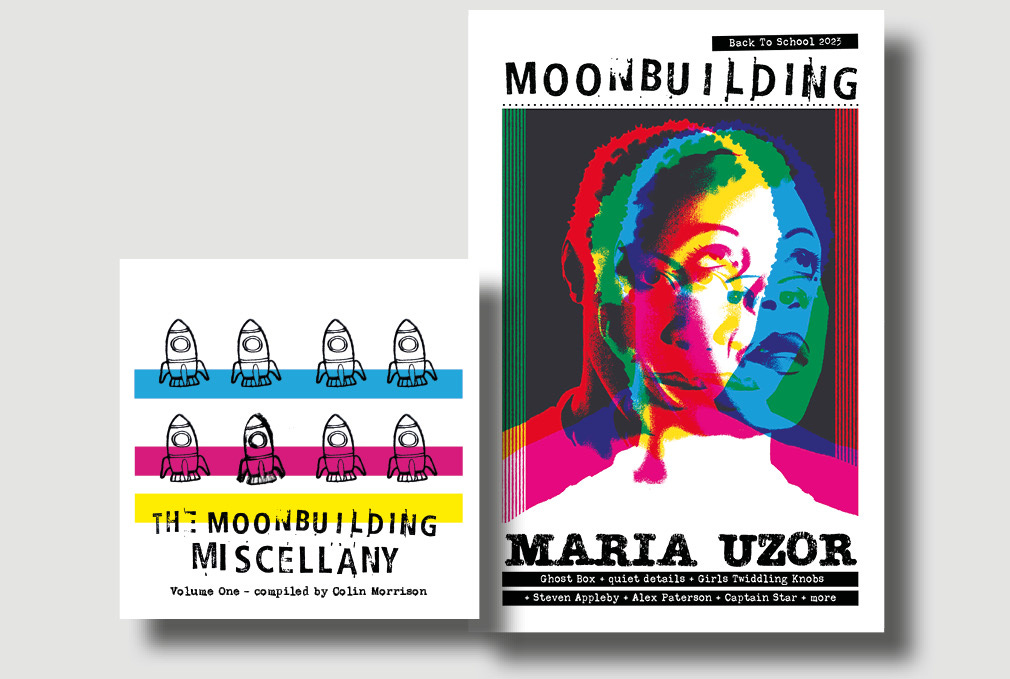Issue 23a / 21 June 2024
In part one of this week's DIY electronic music bulletin... Album Of The Week: Field Lines Cartographer's ‘Portable Reality Generator’ + brilliant interview
Don’t know about you, but somehow I’m carving time out of a schedule that would usually have none in order to watch an awful lot of football. Wish I understood how time works. I’d be so much more productive if I did.
I’m delighted to have the most excellent Field Lines Cartographer as our Album Of The Week. Mark Burford is an artist who I don’t think always gets the credit he deserves. The music he makes is next level and he’s one of my favourite interviews, always entertaining, always insightful. We have a great chat here to celebrate the release of his new record.
Righto, I’ll see you all back here at 3.30pm for part two of today’s mailout. Don’t miss it this week as any one of the pick of this week’s other releases could have been Album Of The Week. No, really. Oh, and a very happy Solstice for yesterday to those who celebrate such things.
Neil Mason, editor
moonbuildingmag@gmail.com
Issue 23 Playlist: See this afternoon’s mailout
The Moonbuilding tip jar: ko-fi.com/moonbuilding
***ADVERTISE HERE***
Email moonbuildingmag@gmail.com
FIELD LINES CARTOGRAPHER ‘Portable Reality Generator’ (DiN)
What is a portable reality generator do you suppose? What does it do, exactly? How does it do it? Do you plug it in? How portable is it? Is it something you can put in your pocket? Or is it something bigger, perhaps with a handle? Do I need one?
Field Lines Cartographer’s Mark Burford says the title just popped into his head one night. He explains that a portable reality generator “enables you to create an alternate world that you can visit and immerse yourself in”. Could be a book or a film and of course, it could very much be music.
“When you listen to certain albums,” says Mark, “you are transported to that universe, that reality, for a while. That’s certainly how I feel when I listen to my favourite records… they’re complete environments you can live in, just like with a really good novel where you become completely immersed.”
If you know the work of FLC, you’ll know his music is all about being immersed. Take a look at his almighty back catalogue and just in the titles you’ll see the kind of worlds he’s conjuring with his modular adventures. ‘Phases Of This And Other Moons’, ‘Dreamtides’, ‘Superclusters’, ‘The Spectral Isle’, ‘The Ferric Landscape’. You can picture them all can’t you?
Over the last few years, Mark has predominantly been releasing on Castles In Space, but here we find him on Ian Boddy’s DiN label, which is fast becoming a seal of approval if one were needed. Ian is a veteran of the modular scene and has been making music since his own explorations in sound began in the early 1980s. He’s been reaching out the new school of synthesists for contributions to his excellent ‘Tone Science’ compilation series for a while and increasingly those artists are featuring in the full-blown releases on the mothership DiN label.
Ian talks about how Mark seems to “channel the Kosmische vibe of early Tangerine Dream without actually trying to copy their style”. While his music does have the Berlin Schoolisms about it, this is no throwback. Mark talks about how anyone making spacey otherworldy synth music is going to find Tangerine Dream seeping in somewhere. Which is a fair point when you consider they’ve released over 300 albums. And, you know, a little channeling of Edgar Frose is never, ever, a bad thing.
‘Portable Reality Generator’ is a beautifully paced record. It feels like it comes at you in movements. The first two tracks, ‘The Sun In Splendour’ and ‘Scattered Light’, are the prologue, two very gentle burbling tracks that slowly guide you into the record. The three tracks in the middle form the centrepiece that spread out over nearly 45 minutes. There are few artists who can hold the attention like Mark Burford. This is a release that clocks in at an impressive 70 minutes, not one of them wasted. The centrepiece is the 20-minute ‘Collapsable Mantra’, which just builds and builds to the point you think it’s going to burst, but it teeters on that brink for as long as it can before stepping back and letting itself fade away.
‘Fog Warning’ plays the same tricks as it grows louder and louder, but it too never tips over the edge. The sweeping chords and tense strings as the track strips back down sound utterly vast. Of this suite of three, ‘Ascending Waves Of Consciousness’ is a belter, as close to disco dancing as FLC gets. It rattles along and, without a drum in sight, it has just got the groove somehow.
The closer, ‘Interface Patterns’, is a wonderfully peaceful conclusion, full of gentle twinkles and bright tinkles, and it brings you back down to where ever it was you left when you started listening to all this.
‘Portable Reality Generator’ could well be the Field Lines Cartographer record I’ve listened to the most. It is lengthy, but it’s a very listenable 70 minutes. So back where we came in. That ‘Portable Reality Generator’ and do you need one? Oh, you most certainly do.
‘Portable Reality Generator’ is out now on DiN
FIELD LINES CARTOGRAPHER
Mark Burford chats about making his full-length debut on DiN, why he’s no Tangerine Dream copycat, music as escapism and the Lancashire electronic music mafia
Photo: Hymns For Robots
Interview: Neil Mason
Hello Mark, how’s things? What are you up to today? What’s for tea tonight?
”Wotcha. Things are good, ta. Today has been an odd one. I spent about an hour fixing some electrical wiring in my car, which was kind of annoying. Then the alarm guys turned up to service the system at our commercial studio premises, which was also annoying for entirely different reasons. But generally OK. A curate’s egg of a day. I don’t think I’ll be having that for tea though. ‘Unsure’ is the answer to that last bit. I’m sure a plan will hove into view upon examining the contents of the fridge.”
Your new album comes in an edition of 333. That’s interesting number. Why 333?
”That’s a really good question. And the really good answer is, I have no actual idea. You’d have to ask Mr Boddy. I’m sure there is a nefariously clever reason, knowing Ian.”
It’s only half the number of the beast? Is it a baby beast?
”Well yeah, that’s what I immediately thought too. It’s a demi-beast. It’s not wise to go full beast I guess. Not at my age anyway.”
Ian Boddy’s DiN label celebrates 25 years at the coalface this year. Happy birthday eh?
”Absolutely! What Ian has achieved with DiN is incredible. He was a trailblazer and now is an actual institution for synthesiser music.”
When did DiN first ping on your radar?
”Oh, a long time ago, probably the early 00s. Ian and I met around then doing our day jobs of the time. I was a slip of a lad working in a studio, he was the sales rep for Akai UK, flogging samplers. We used to acquire a lot of secondhand junk back in those days – all sorts of bits of bobs, from guitar amps to headphones, and we had this ancient test oscillator from a lab sitting on a shelf. Ian spotted it and said, ‘Can I buy that?’. I think he gave me a tenner for it.”
Ian talks about you being part of the new school of modular synthesists, you’ve been doing this for a good while now. Do you feel new school?
”Ha-ha, no, I definitely feel very old school. I’ve been mucking about with synthesisers since I was in my late teens, so that’s a long time. But yeah, I only made the transition to modular synths in the last 10 or so years.”
Is what you do something that improves with age? You’ll be Grandmaster Burford before you’re 80?
”I hope so, yeah. I still learn new things every day and I think my music now is the best it’s ever been. It’s a constant process of learning and trying to improve. I’m always meeting brilliant people who inspire me and make me think about things differently, which is probably the most rewarding bit of all. I don’t think you ever sort of hit a ‘stop’ point. There’s always more to learn and more ways you can grow and explore different things.”
I saw somewhere that you make your work with “primarily modular synths”. Are there non-modular extra ingredients? Isn’t that cheating?
“There’s definitely no such thing as cheating. I’m not a purist about anything, I think people should use whatever they want, however they want to get the job done. It just happens that almost all of my main instruments are modular or semi-modular synthesisers, mainly because I sold everything else a few years ago. But I’ll absolutely grab something from software or use a piano or something if it’s going to solve a problem or help me complete a project somehow.”
Do you set yourself rules?
”I do tend to set myself rules though for different albums or projects purely because I find it very helpful creatively. Setting a few boundaries and thereby narrowing some of the otherwise almost limitless possibilities helps you shape something with a purpose, it gets the job done. So I have made albums that use only one synthesiser, for example. But there’s absolutely no ‘right’ way of doing something. Anyone who tries to tell you that is talking balls.”
Ian has really been embracing the new school over the last few years. What is it that groups you together do you think? I’m thinking people like Stephen Buckley, Loula Yorke, Thomas Ragsdale, Tom Kennedy, etc…
”I’m not really sure. I think it’s possibly that despite using variations on an instrument paradigm that’s been around since the 1970s, all those musicians are definitely creating work that’s very fresh, very ‘now’. I’m certainly not interested in revisiting a sound that’s already been done. Sure, there are always hints of it – all music is informed by what’s gone before obviously – but it’s nice to try and drive forward as much as you can. That’s what interests me.”
‘Portable Reality Generator’ is a great title. Would one of those be expensive do you think? What does it actually do?
”Cheers, it just sort of popped into my head one night. In terms of what it is, well it could be expensive, could be cheap. Or free. If it enables you to create an alternate world that you can visit and immerse yourself in, you’ve cracked it. Might be a book. Or an album or a film. As we carry that stuff around with us on the type of handheld device I’m using right now to answer this, it’s pretty damn portable too.”
Ian talks about how you seem to be channelling Tangerine Dream without realising it. Is that the case?
”I certainly haven’t been aware of it, no. But I guess once you start making spacey, expansive and otherworldly music with synthesisers it’s definitely a distinct possibility that some of this is going to bleed through.”
He says that you end up in a similar sound world via a completely different path.
”I think it’s fair to say that the sound world is very similar, but I don’t think my stuff is particularly TD-adjacent in actual musical terms. We all hear different things though, especially when you’ve created it. I can never second guess what other people are going to pull from a record I’ve made.”
I’m assuming you didn’t grow up with Tangerine Dream ringing in your ears?
“Obviously they’ve left a massive footprint on this whole thing, ‘Phaedra’ and ‘Rubycon’ are certainly two of my favourite records along with Klaus Schulze’s solo stuff, ‘Timewind’ especially. But I didn't really discover them until the post-acid house era when they became huge as part of the whole chillout after-party scene and directly fed into stuff I loved like The Orb, FSOL, KLF, etc. So I got into TD from that angle really.”
What was in the air, musically, when you were growing up?
“I grew up listening to modern jazz. My dad was a massive fan and a superb pianist and keyboard player. So it was all Miles, Bird, Art Blakey, Weather Report, Oscar Peterson, Dizzy, etc. Then of course living just down the road from the 2 Tone city, ska was everywhere and my big sis was a massive fan of The Specials, The Selector, The Beat, she was a proper rude girl. I think Monsieur Jarre might have been the first purely electronic thing I heard. Then of course UK synthpop happened when I was a little kid and that progressed into my teens. But I still absolutely love the 2 Tone sound, stuff you hear as a kid sort of becomes part of you doesn’t it? And I still love modern jazz, even if St Hubbins and Tufnel contend it’s ‘just mistakes’.”
Back to the ‘Portable Reality Generator’ and how you go about creating new worlds through your music. Tell me more…
“Well, it’s not just my music really. It’s the general idea that when you listen to certain albums you are transported to that universe, that reality for a while. That’s certainly how I feel when I listen to my favourite records… they’re complete environments you can live in, just like with a really good novel, where you become completely immersed. But yes, as a creator of music I sort of get a double-whammy of that effect really, as I get to live inside this thing as I’m creating it too. It can be quite disorienting actually. I often find I’ve been working on something for like four hours straight in the studio and then I finish and snap out of it and it’s like waking up from a dream. I love that.”
You’re close-knit with Polypores, you’ve known each other for a long time. He creates new worlds too. Do you ever compare notes?
“Oh yeah. All the time. I think we have a sort of permanent feedback loop where we’re informing and inspiring each other. Sometimes it might be quite technical things, about equipment or production techniques and other times it’s just about aesthetics and ideas. Most of our conversations are like that, even if we’re talking about weird films or UFOs, it’s all grist to the mill. Sometimes though, most of the time really, we’re just quoting ‘This Is Spinal Tap’ or ‘The Big Lebowski’ at each other.”
Your worlds tend to be quite spacey, galactic even? Stephen’s are more organically grounded, secret worlds, right?
“I’d say that’s broadly right. I’m not sure about Bucko’s stuff being ‘grounded’ though! It’s pretty out there, in a more psychedelic, headfuck kind of a way. It does sound like it’s growing though, whereas I think my work tends to conjure weird landscapes, planets and suns and can be pretty glacial. There’s a definite continuum in our music, but it’s very different. We have little hints of each other at times.”
Creating these worlds is a form of escapism, do you feel the need to escape?
“Oh 100 per cent. It’s pure escapism and I absolutely need it. I really admire people who are able to produce overtly political or ‘statement’ music because they’re tackling issues. I’m at a point in my life where the injustice, the horror, the unfairness, the crass stupidity and the general bullshit that most of us either experience, or witness as bystanders to life in the first quarter of the 21st century just gets too much. I know that’s kind of cowardly, but I absolutely use my music as a holiday from it. A break. I think other people do too when they listen to it. I hope they do. Even when my stuff takes a dark turn, it’s not really connected with the world we inhabit in reality, it’s a sort of fictional darkness. I’m not going to apologise for making escapist music.”
You’re based in Lancashire, which is a total hotbed for this stuff. There’s Hymns For Robots, the Concrete Tapes label, you, Polypores, Warrington-Runcorn… what is it about that little corner of the word?
“I’ve absolutely no idea! I mean the north-west has a rich history of electronic music, mainly centred on Manchester and Liverpool of course, but why we seem to have this little thing cooking away a bit further north right now I just don’t know. Leylines probably. I’m glad you’ve mentioned Concrete Tapes, Joe Maclaren often doesn’t get the props he deserves. He was absolutely a fundamental influence on both myself and Polypores and others actually nailing this stuff down and making it a tangible thing. Thanks Joe.”
The centrepiece of the new record is the 20-minute ‘Collapsable Mantra’, where does something like that come from?
“Like most of my work, it comes from the aether. I don’t know, I just set the patch up, have a bit of a play around, got a few ideas of where it could go and things that would sound cool and then dived in. You’ve got to strike while the iron’s hot as the saying goes. It was just an improvised take from this base I’d set up. If you’re in the right place mentally it just sort of happens. I don’t know. I enter a sort of dream state, that’s when the best things happen and that definitely happened there.”
We’ve talked before about timings. How do you know when something is at its optimum length? There’s tracks here that are six minutes, that’s almost punk rock for you!
“I think you just know how much you can wring out from each idea. So with the aforementioned ‘Collapsable Mantra’, that just kept going and going, more avenues kept opening up as the thing progressed. Other ideas are a lot more ephemeral. You get a sense that the thing’s done, you’ve extracted all the goodness from it. It’s a bit like eating a piece of fruit. It’s just an instinct really. Unless you’re getting close to the end of a project, I don’t worry about anything other than the instinctive shape of the track, but when you’re close to assembling a complete album you obviously have to pay track lengths some mind, depending on the format. If the thing’s going to be on vinyl you’ve realistically only got about 22 minutes per side to play with. I didn’t have to worry about that at all with ‘Portable Reality Generator’ because CD is vast.”
I often think your work is going to erupt, but you manage to keep it teetering on the brink, that’s a very cool trick to pull off, yes?
“I’m really glad you’ve noticed that, because yes, I’m trying to do exactly that more often than not. I love pushing something as far as it can go and then just rein it in at the last minute. I’ve done that particularly on my next album for Castles In Space, which is broadly about the cycle of chaos, where a couple of times I really try to get the track to the point of totally collapsing in on itself and then just rescue it. If you can manage to pull it off in a live context it’s even better, but it’s a bit nerve wracking!”
And then I remember if I want the fireworks you also make music as Impulse Array. What’s happening there? There’s been no release for a while?
“IA has basically been on furlough for a while. For me, techno music has to be 100 per cent genuine, it has to be from the heart, from the soul. I don’t think it’s very good being forced. You’ve got to feel it. Every time I sit down to make some music these days, the Cartographer sound comes out. But never say never and all that. It could change at the drop of a hat and I might make a blistering space techno album again. Impulse Array is just parked there, ready for whenever I feel the urge.”
What’s next up for you, musically?
“I have a new album slated for release on CiS, I think it’ll be at the back end of this year or early next year. And I have something else already in the can too. We’ll see what happens with that. I’ve got plenty of gigs, including going to play in Helsinki along with Gordon and Buckers, so that’s going to be a blast.”
For more Field Lines Cartographer, visit fieldlinescartographer.bandcamp.com
***ADVERTISE WITH US***
Email moonbuildingmag@gmail.com
A MESSAGE FROM THE MOTHERSHIP
MOONBUILDING ISSUE 4, £5 (+P&P). GRAB YOURS WHILE STOCKS LAST … MOONBUILDING.BANDCAMP.COM
The latest issue of MOONBUILDING is full to the gills with the good stuff. On the cover, star-in-the-making Maria Uzor, we profile label-of-the-moment quiet details, there’s an incredible interview with Captain Star creator Steven Appleby, and Ghost Box’s Jim Jupp gets busy with our There’s A First Time For Everything questions.
We review a big pile of releases from labels including Castles In Space, Woodford Halse, Persistence Of Sound, Assai, Ahora, DiN, Werra Foxma, Ghost Box and many more. There’s a column from The Orb’s Alex Paterson and the world-famous Captain Star cartoon strip.
This issue’s CD is ‘The Moonbuilding Miscellany – Volume One’, which is put together by CiS supremo Colin Morrison. It’s a belter featuring tracks from the likes of Lo Five, Lone Bison, Twilight Sequence, Ojn, NCHX and more.
Moonbuilding Weekly is a Castles In Space publication.
Copyright © 2024 Moonbuilding






